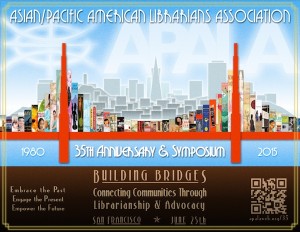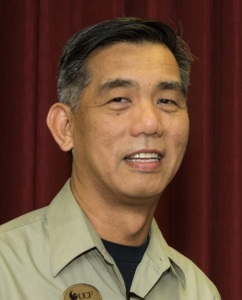Engaging APALA’s Present: Interview with Ven Basco, APALA Executive Director (2012-Present)
by Melissa I. Cardenas-Dow and Alyssa Jocson Porter

In early July 2014, APALA Web Content Sub-committee member Melissa Cardenas-Dow corresponded with APALA Executive Director Ven Basco. We spoke about APALA’s upcoming 35th Anniversary & Symposium and the current state of APALA, as an organization and as a group of diverse librarians, sharing many different things with each other. The following article is the second of a three-part mini-series highlighting APALA’s 35th Anniversary. It also provides an edited version of our conversation.
Melissa Cardenas-Dow (MICD): Please briefly tell us about yourself and your position(s) in APALA, especially your role in planning APALA’s 35th Anniversary celebration.
Ven Basco (VB): I am the current Executive Director of APALA. I was also APALA’s past president and the chair of the 30th APALA Anniversary celebration held in Washington DC in 2009. I am a steering committee member of the 35th Anniversary celebration. I co-chair the APALA literature awards committee with Dora Ho. As Executive Director of APALA, I work with the Executive Board on many organizational matters, including working with ALA on programs, conference experiences, and logistical matters. For the APALA 35th Anniversary matters, I work with Eileen Bosch, current APALA President, and the APALA Anniversary Program co-chairs, Florante Ibañez, Gary Colmenar, and Jade Alburo.
MICD: What do you think is the most important function(s) of APALA at the present time?
VB: Historically, APALA is the bigger umbrella organization that provides a home for librarians who are looking to express aspects of their ethnic and cultural heritage that may not be raised or made visible through other groups affiliated with ALA. Right now, we want to demonstrate to the larger ALA community that we exist, so I’d say the visibility of APA librarians and their contributions to our profession is one of the most important functions APALA has.
MICD: How well do you think APALA is doing, in terms of achieving its strategic plans and goals?
VB: We haven’t been getting the greater exposure and visibility that larger ethnic caucuses have been able to achieve. However, we are continuing to work on this, doing all the things we are doing, making sure that APALA and its members’ accomplishments are visible and that we share our collective and individual successes. We are heading toward achieving our goals.
MICD: At which areas do you think APALA can do better? Why do you think so?
VB: We want to celebrate and share the accomplishments of our members, not just within ALA, but also at their local libraries and within their own communities. Our individual members’ accomplishments may not be ALA related all the time, but they are achievements nonetheless. APALA’s relationship to each individual member makes it important for our organization to celebrate and recognize each achievement. I do think this is important to do because by recognizing our members and their accomplishments, we are also raising the visibility of our organization. Improving our visibility also goes hand-in-hand with growing our membership through recruitment and outreach.
Organizationally, we can do better with prioritizing our efforts. I do think that communications, recruitment, and outreach are the top priorities. Followed by fundraising and financial management. We are making efforts to address these issues, while balancing the fact that we are a 100% volunteer organization.
MICD: What do you see as APALA’s role(s) as an ALA ethnic/cultural affiliate?
VB: As an organization, APALA does provide a home for API librarians and allies. However, I do think that this is just one small aspect of our role within the librarian profession and within ALA. We do advocate for API librarians and API communities, but we also want to emphasize our visibility and value to the larger community of ALA. That’s important work and many of our members are involved in such efforts. But we don’t necessarily have to focus on work that centers on our ethnic or cultural backgrounds. We each should be able to say, “I have achieved and contributed such-and-such to advance and improve ALA and the profession. And I am an APALA member.” Making contributions to ALA and the library profession, I think, is also very important. APALA benefits greatly from such types of visibility and recognition, too.

MICD: In a previous conversation, Gary Colmenar mentioned that the diversity among API librarians is both APALA’s greatest strength and greatest challenge. What do you think about this? How does diversity among the APALA members affect its current operations, if at all?
VB: I think the challenge is really in promoting and making visible the myriad accomplishments of our members, regardless of their diverse backgrounds. From my perspective, the diversity of our membership is great and wonderful, and it doesn’t pose great problems for APALA’s operations. The continuing challenge is ensuring the visibility of the organization and its members. Many different things come into play with this, including discrimination or even the concern and fear of being discriminated against. I know many of us feel concerned about being relegated to “only Asian roles,” to use a phenomenon in entertainment and show business. Being looked at as not as competent, not as good, etc. But as far as the continuing operations of APALA, the diversity of members doesn’t pose an insurmountable great challenge.
MICD: What about in terms of specifically promoting and advocating on behalf of API library communities and patrons?
VB: In terms of promoting and advocating for API communities and patrons, I think diversity is pretty challenging. We need to find commonalities besides our cultural origins and heritages that falls under the label “Asian/Pacific American.” If we can unify and realize that our commonality rests on our understanding of knowledge and information practices, not our cultural and ethnic heritages, then we, APALA, can have a better voice at ALA.
MICD: With regards to building bridges with other ALA groups and affiliated organizations, especially those that focus on cultural and ethnic diversity, could you describe for us the collaborative projects APALA is currently engaged in?
VB: TalkStory with AILA (American Indian Librarians Association), definitely. Our participation in JCLC (Joint Conference of Librarians of Color) is definitely collaborative. In addition to these, we should continue to look for opportunities with the other cultural affiliates of ALA, other ALA roundtables and divisions, and organizations outside of the ALA circle. We should also investigate conducting collaborative projects with library organizations in other countries.
MICD: Based on your experiences in APALA, could you relate to us a story that can be illustrative of your experiences?
VB: In my state, Florida, there are very few of us. The regional aspect really affects my ability to have experiences beyond our national meetings.
MICD: How do you think the APALA 35th Anniversary & Symposium will serve to further nurture APALA’s current goals and objectives?
VB: The programs are related to the ultimate objectives of our organization. I think the Symposium can do a lot to promote APALA, raise our visibility, and strengthen our outreach efforts. Since our Symposium occurs right before ALA, we can think of the APALA 35th Anniversary & Symposium as a prequel to ALA Annual 2015.
MICD: What message do you hope attendees will get out of the APALA 35th Anniversary & Symposium?
VB: I hope attendees will see that APALA is a great collaborative partner and that we have many members who are willing and able to work with others toward common goals. At the same time, I hope attendees will learn things from the different programs that will help them become better librarians, not just better API librarians.
MICD: Any last, closing words?
VB: We are small, but we have been growing. We have our shares of troubles, but we also have our share of successes. Though we cannot be everything to everyone, we will continue to contribute to our librarian community. We welcome and encourage participation from anyone, anyone, who shares our mission and goals.
Questions written and interview conducted by Melissa I. Cardenas-Dow. Editing and writing support provided by Alyssa Jocson Porter.
